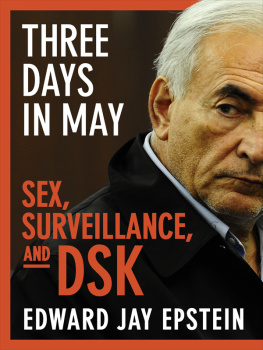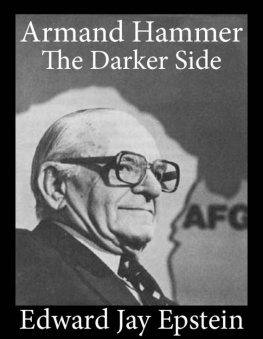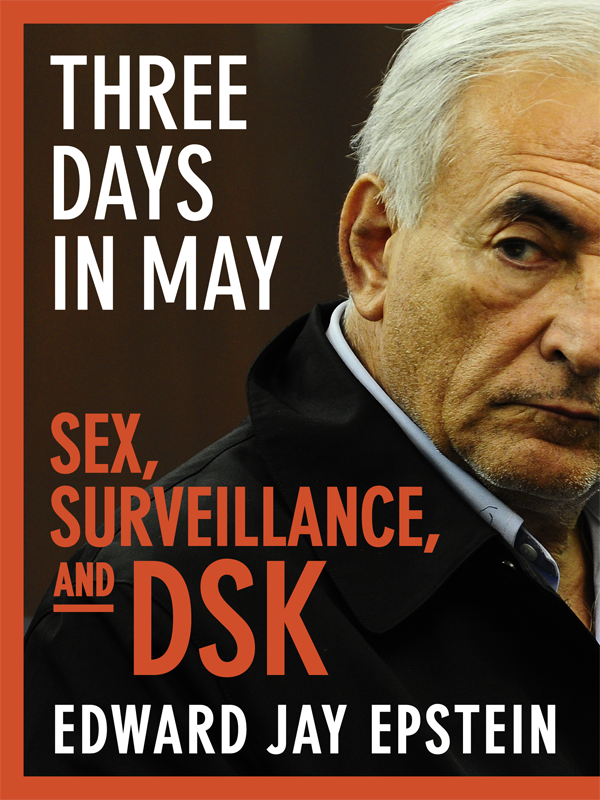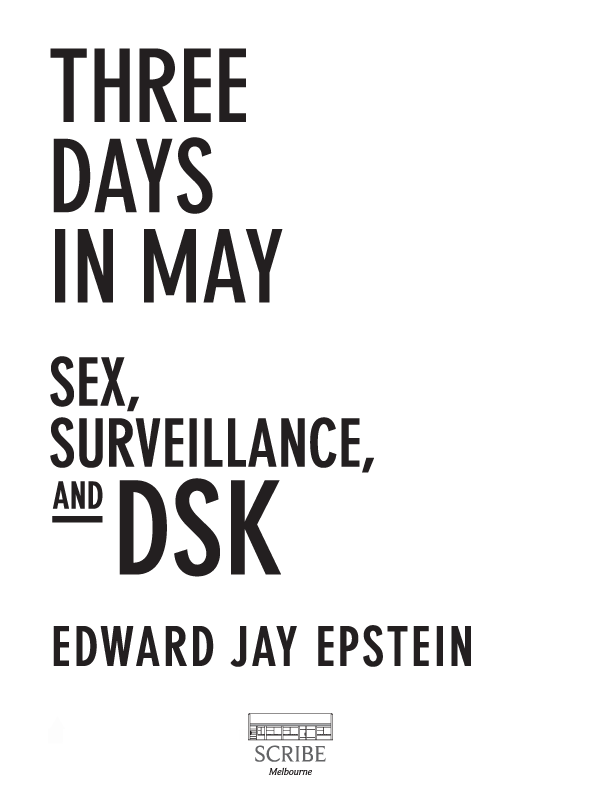Copyright E. J. E. Publications, Ltd. 2012
Part of this book appeared in an earlier form as What Really Happened to Strauss-Kahn? in The New York Review of Books of December 22, 2011. The drawing of the 28th floor of the Sofitel is by Mike King and first appeared in The New York Review of Books. Copyright Mike King, 2011.
All rights reserved. Without limiting the rights under copyright reserved above, no part of this publication may be reproduced, stored in or introduced into a retrieval system, or transmitted, in any form or by any means (electronic, mechanical, photocopying, recording or otherwise) without the prior written permission of the publishers of this book.
A Cataloguing-in-Publication data record is available from the National Library of Australia
Preface
A Time-stamped Inquiry
There was a time not long ago, indeed up until the first decade of the twenty-first century, when surveillance often required a physical presence. Images of members of a surveillance team breaking into a home to plant a microphone, sitting in a parked van with earphones and cameras, climbing a telephone pole to install a tap, and following a man to a meeting place were burnished in the popular imagination by movies such as The Conversation, Tinker, Tailor, Soldier, Spy, and The Lives of Others, each of which had a basis in reality. Now, however, with the proliferation of smart phones, credit cards, EZ Passes, GPS trackers, e-mails, text messages, and closed-circuit television (CCTV) cameras, such surveillance can be done from a remote location. When individuals use these ubiquitous devices, or are exposed to them, to make a call, go on the Internet, drive their cars through a toll plaza, pay a bill electronically, visit a social network, use Twitter, or share a photo, they leave a digital trail that can be reconstructed. Camera-equipped phones that locate the user via a rapid GPS signal, which were rare at the time of the attack on the World Trade Center in 2001, are now used by a large part of the population to phone, text, e-mail, store voice mail, conduct Internet searches, pay bills, and organize appointment calendars. These data are routed through cyberspace via a ganglia of Internet service providers, or ISPs, by global telecommunications companies. Once a security service acquires the ability to hack into the ganglia, it only needs to determine the phone number of a target to follow his or her every move, past and present, in cyberspace. Nor is it an insurmountable challenge for even a second-rate intelligence service, if it is well funded, to obtain this capacity. After Muammar el-Qaddafis regime fell in 2011, documents found in Libyan intelligence by the Wall Street Journal revealed that Amesys, a subsidiary of the French company Bull SA, had supplied Libyan intelligence with its EAGLE Interception system, which allowed Libyan intelligence to gain access through ISPs to the smart phones of a vast number of suspected dissidents and then, through special filtering software, intercept their e-mails, online chats, and Facebook messages through what the company called massive interception. If such products are commercially available, it is not difficult to imagine what a first-class intelligence service can achieve in terms of remote surveillance.
A former top executive of the National Security Agency said to me in 2011, If just twenty years ago a book described a world in which every citizen voluntarily carried around his own bug so Big Brother could listen to his conversation, it would be deemed science fiction, but now it is no longer fiction. He explained that since a smart phone contains all the elements necessary for surveillance, including a power supply, a microphone, GPS, and a continuous transmitter, any security service can send it software codes that will turn it into a bug that monitors conversation even when the user believes it is turned off. A sophisticated target can, of course, take counter-measures, such as removing the phones battery when having a sensitive conversation. In this game, even such a move can be defeated by planting a hidden capacitor in the phone, which will act as a spare battery, although this requires physical control of the phone itself.
Similarly, if a computer is connected to a network, a security service can remotely embed a program that will allow it to monitor all the keystrokes a target makes on it. And with a facial-recognition program, a security service can follow a persons movements on networked CCTV cameras, which are already ubiquitous in some cities, such as London. As a result, much of what a person does, whether he realizes it or not, is time-stamped by a digital camera or cell phone.
On May 14, 2011, when Dominique Strauss-Kahn, better known by his initials DSK, had his now-infamous encounter with a maid at the Sofitel in New York, much of what occurred before and after was captured by elements of this new surveillance regime, including CCTV cameras, cell phone ISPs, credit-card charges, radio police logs, and the hotels electronic key-swipe records. After DSK was arrested on charges of sexual assault, the Manhattan district attorneys office subpoenaed that material. In August, however, the district attorney came to the conclusion that the only witness in the case, the maid, could not be believed beyond a reasonable doubt, and he moved on August 22, 2011 to drop the case. After the charges were dismissed, I obtained a significant part of this evidence, from sources that prefer to remain anonymous, for an article I was writing for the New York Review of Books. After the article, What Really Happened to Strauss-Kahn, was published in November 2011, many more of the court-protected documents became available to me. This time-stamped material, much of which is included in this book, allowed me to reconstruct the reality behind the mystery in a way that I could not have done otherwise.
Chapter I
From the W to the Sofitel
At 5:00 P.M. on Friday, May 13, 2011, Dominque Strauss-Khan, better known in France by his initials, DSK, boarded U.S. Airways Flight 2180 at Reagan National Airport. The 62-year-old French-born economist had a busy schedule. He planned to be in New York only overnight to see his daughter. He would fly back to Paris on Sunday, and then go that day to Berlin, where he had scheduled a meeting with Angela Merkel, the German chancellor. Since September 2007, DSK had been head of one of the worlds most powerful financial institutions, the International Monetary Fund, an organization of sovereign states with the job of providing loans to any nation in financial trouble. For the past six months, he had had to deal with a crisis of unprecedented proportions. Greece, one of the weakest economies in the European Union, was running out of money. It now had to refinance its massive debt but lacked the credit to borrow money at rates it could afford. If Greece did not get the money in the next few months, it would have to default on its bonds. Such a bankruptcy would threaten the largest banks in France and Germany and set off a cascade of falling dominoes that could not only destroy the euro but plunge Europe and America into financial chaos. Since the IMF was the largest holder of Greek debt and could draw upon the resources of the 187 nation-states that constituted its membership, DSK expected to play a major role in preventing this impending disaster. He had qualification in this regard. After obtaining a law degree and PhD in economics at the Universit Paris at Nanterre in 1977, he was appointed to head the finance department of the Plan Commission in 1982. He served as Minister of Industry and Foreign Trade from 1991 to 1993 and as Minister of Economy, Finance and Industry from 1997 to 1999. He also played a major role in the French Socialist Party, having first been elected to the National Assembly in 1986, and was now in line to be its presidential candidate. Even though French president Nicolas Sarkozy had backed DSKs appointment at the IMF four years earlier, he was now emerging as Sarkozys leading rival for the presidency, and now he was well ahead of him in all the national polls. If elected, DSK would be Frances first Jewish president.














